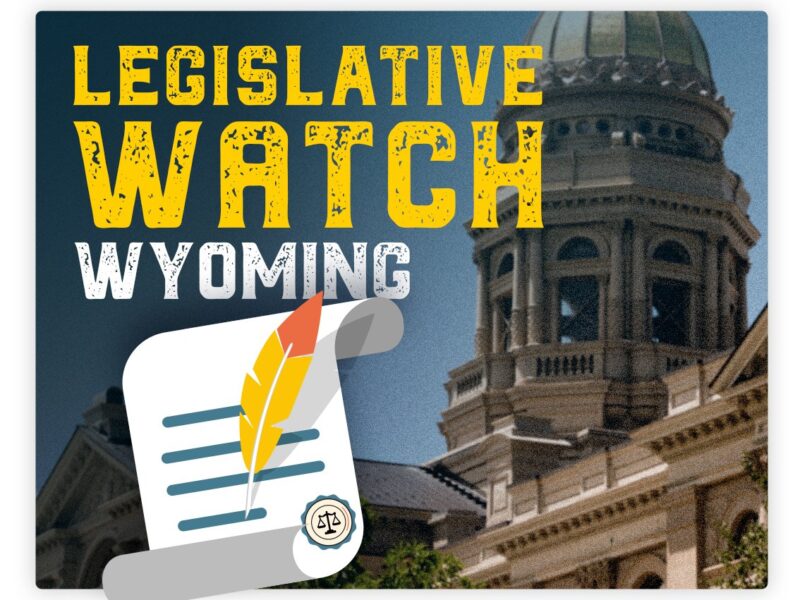LEGISLATIVE WATCH WYOMING: Legislature to Continue Offering Remote Access to Committee Meetings
Committee leaders could be required to allow online participation during 2024 session
- Published In: Politics
- Last Updated: Apr 06, 2023

By CJ Baker
Special to the Wyoming Truth
When the House Minerals Committee convened for its first time in the 2023 General Session, Chairman Rep. Don Burkhart laid out the ground rules: Cellphones needed to be silenced, comments should be directed to the chair — and going forward, no one could participate by Zoom.

“This will be the last time we have virtual attendance from anyone,” Burkhart (R-Rawlins) announced on Jan. 11. “Whether it’s committee members, [the] public, agencies, I want everybody in the room who wants to speak.”
At a meeting a couple days later, he added that, “if it’s important enough, I think you should be here in person.”
However, it appears Wyoming’s legislative leaders think differently: At its March 23 meeting, the Legislature’s Management Council voted to generally require chairmen to allow remote participation during the interim meetings that will be held in the coming months. And council members indicated they may implement a similar mandate for the 2024 Budget Session.
“I’m one of those that believes we should accept public comment,” said House Speaker Rep. Albert Sommers (R-Pinedale).
Sommers lives on the other side of the state — roughly a five-hour drive from the capitol in Cheyenne — “and I think it’s important for my constituents to have access to the Legislature wherever they’re at,” he said.
“… I know the best testimony is in person,” the speaker added, “but I think in this day and age we can allow testimony [remotely].”
A call for uniformity
During the 2021 and 2022 interim committee meetings and the recent General Session, the Management Council let chairmen decide whether to allow remote testimony. However, the panel removed that discretion for the meetings taking place between now and next year’s session. If the facility that’s hosting the interim committee meeting can accommodate remote testimony — i.e. the building has the internet bandwidth and other IT infrastructure — chairmen need to allow it.
Part of the goal was to establish more uniformity. In the recent session, 18 of the 20 chairmen of the legislature’s standing committees generally allowed remote testimony, but Burkhart and Sen. Charlie Scott (R-Casper), who leads the Senate Education Committee, did not.
Rep. Dave Zwonitzer (R-Cheyenne) said he doesn’t like making members of the public “know the rules of the game” when it comes to remote participation.

“Because sometimes even co-chairmen [differ] — you know, the House chairman says no, the Senate chairman says yes,” Zwonitzer said. “I just don’t think that’s a good look for the public.”
He also said there were instances when chairmen said they wouldn’t accept comments via Zoom, but then did in certain circumstances, creating “some confusion and backlash.”
Sen. Tara Nethercott (R-Cheyenne) agreed that having policies differ from committee to committee is “a disservice to the public.” She said remote access “enhances the process” and “should be considered like all other testimony.”
Balancing access and order
Those who wish to testify remotely do face one extra requirement, as they generally must sign up by 5 p.m. on the day before the committee’s discussion.
The deadline “is really more about an idea that it should take a little bit of effort for a member of the public to look at the agenda, decide they wanted to sign up,” explained Matt Obrecht, the director of the Legislative Service Office. But Obrecht noted that chairmen can still allow folks to sign up late — and many have done so.
Chairmen also continue to have the ability to limit, cap or end all public comments to fit time constraints — something that can be as much of an art as a science.
During the recent session, committees generally took comments from the sponsor of the bill being considered, then heard from state agencies, others in the room and finally from those online. But the situation can change when chairmen have many people lined up to speak and limited time to hear them out. For example, when a proposal that would have made it a crime to “change the sex” of a child drew a host of commenters, Senate labor committee Chairman Sen. Fred Baldwin (R-Kemmerer) favored those who had traveled to Cheyenne over those online and from the area.
The typical pecking order drew some resistance from a couple more conservative members of the House. At a town hall last month, Rep. Abby Angelos (R-Gillette) complained that agencies and lobbyists are prioritized.

“We don’t really listen to the people,” Angelos charged, calling for more time for public comments.
A helpful addition
Still, in a divided Legislature, there appears to be widespread agreement that the addition of remote testimony has been a good thing.
Cindy DeLancey of the Wyoming Business Alliance said the ability to tune in and participate from anywhere is “just so helpful.”
“Many business people are very interested in the work of the Wyoming Legislature,” DeLancey said, “and business people are often [so] busy running their businesses that they’re unable to come down here to be able to testify in person.”
Further, with this winter’s weather, “trying to cross I-80, it’s been darn near impossible for some people to be able to get virtually anywhere,” she said.
Lawmakers themselves have also taken advantage of the expanded online access. The Management Council specifically permitted legislators to attend interim meetings remotely in 2021 and 2022 — and two of the council’s 10 members Zoomed into last month’s meeting.
While the panel of legislative leaders bolstered remote access to committee meetings in the interim, it’s still considering whether to do so in the 2024 Budget Session. Obrecht said the question was previously left up to the House and Senate to settle. The Management Council sets policy on “all sorts of session issues,” he said, but “whether that’s appropriate or not is an open question.”
Sommers said the council will revisit the topic closer to the 2024 session.













